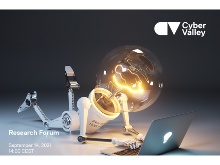Cyber Valley Research Forum
On 14 September 2021 from 2:00 – 4:30 p.m. a new edition of the Cyber Valley Research Forum will take place. This edition of the event will focus on the Cluster of Excellence “Integrative Computational Design and Construction for Architecture” (IntCDC) at the University of Stuttgart and on research groups at the University of Tübingen focusing on geosciences, climate and sustainability research.
Due to COVID-19 restrictions, the workshop will be held online (Zoom).
Schedule
|
14:00 |
Welcome |
|
14:05 – 14:15 |
Prof. Achim Menges Institute for Computational Design and Construction, Cluster of Excellence IntCDC, University of Stuttgart Title: Introduction to IntCDC Abstract: The vision of the Cluster of Excellence Integrative Computational Design and Construction for Architecture (IntCDC) is to harness the full potential of digital technologies in order to rethink design, fabrication and construction based on integration and interdisciplinarity, with the goal of enabling game-changing innovation in the building sector as it can only occur through highly integrative fundamental research in an interdisciplinary, large-scale research undertaking. |
|
14:15 – 14:35 |
Prof. Dr.-Ing. Cristina Tarín Institute for System Dynamics, Cluster of Excellence IntCDC, University of Stuttgart Title: Co-Design for Architecture, Engineering and Construction using Bipartite Graphs Abstract: The architecture, engineering and construction (AEC) industry consists of several players from different domains. They usually work in a sequential process, which is slow, costly and problems are identified in late stages. Co-design helps to identify and predict problems in early stages throughout different domains such that the design, engineering, manufacturing and construction process can be improved. We present an approach to enable co-design using bipartite graphs, which are capable to integrate expert knowledge, physical models and machine learning models from different domains. The different models form a computational network, which allows e.g. the architect to automatically analyse the feasibility of manufacturing a design. |
|
14:35 – 14:55 |
Prof. Dr.-Ing. Peter Middendorf Institute of Aircraft Design, Cluster of Excellence IntCDC, University of Stuttgart Title: Data-driven approaches for fiber composites technologies and simulation Abstract: Fibre composites for lightweight and wide-span architecture applications are one research area within IntCDC. The technology focus is laid here on freeform winding using collaborative robotics and the respective winding path is generated in a co-design approach. Whilst this is a collaborative effort of a group of IntCDC Principal Investigators, there is also a growing activity of supporting data-driven approaches at the Institute of Aircraft Design to make use of various sensor data along the process chain of a composite structure and thus to overcome the limitations of classical modelling and simulation techniques. |
|
14:55 – 15:15 |
Tenure-Track Prof. Dr. Thomas Wortmann Chair for Computing in Architecture, Institute for Computational Design and Construction, University of Stuttgart, Cluster of Excellence IntCDC, University of Stuttgart Title: AI for AEC Abstract: Tenure-Track Prof. Wortmann will present examples of the rich opportunities to apply AI in the Architecture, Engineering and Construction (AEC) sector, including architectural design optimisation, modelling of design and construction processes, predicting wind flow around buildings, predicting the behaviour of heterogeneous materials, and adaptive robotic control. Ultimately, these applications contribute to a reimagining of how our built environment is planned and constructed, which is an urgent need in light of the impending climate catastrophe. |
|
15:15 – 15:35 |
Dr. Nicole Ludwig Machine Learning in Sustainable Energy Systems, Cluster of Excellence Machine Learning: New Perspectives for Science, University of Tübingen Title: Forecasting Sustainable Energy under Uncertain Weather Abstract: The increasing share of sustainable energy generation in the electricity system comes with significant challenges. One of the main challenges is the volatility of sustainable energy generation due to its dependency on the weather. To efficiently integrate sustainable energy into the grid, the expected electricity supply and demand have to be forecast accurately. In this talk, I will introduce the challenges we face when forecasting weather-dependent energy supply and demand and how probabilistic machine learning can help alleviate some of these challenges. |
|
15:35 – 15:55 |
Dr. Bedartha Goswami Machine Learning in Climate Science, Cluster of Excellence Machine Learning: New Perspectives for Science, University of Tübingen |
|
15:55 – 16:15 |
Prof. Dr. Thomas Scholten Chair of Soil Science and Geomorphology, Department of Geosciences, University of Tübingen Title: Machine Learning in Soil Science Abstract: Soils are the most important basis for our nutrition. Their quality determines the food security of the world. Machine learning methods help to determine the underlying soil properties and to predict their spatial distribution on Earth. The presentation will explain the underlying theoretical approach of state factors and address the concept of relevant range of scales for multi-scale contextual spatial modelling of soil properties. Further, I will show results from my research in different parts of the world and demonstrate the potential of data-driven models for geo- and environmental science. |
|
16:15 – 16:30 |
Wrap-up |
The Cyber Valley Research Forum aims to promote networking between Cyber Valley researchers, partners and actors. With different formats, it offers participants the opportunity to draw attention to their research within the Cyber Valley ecosystem.


